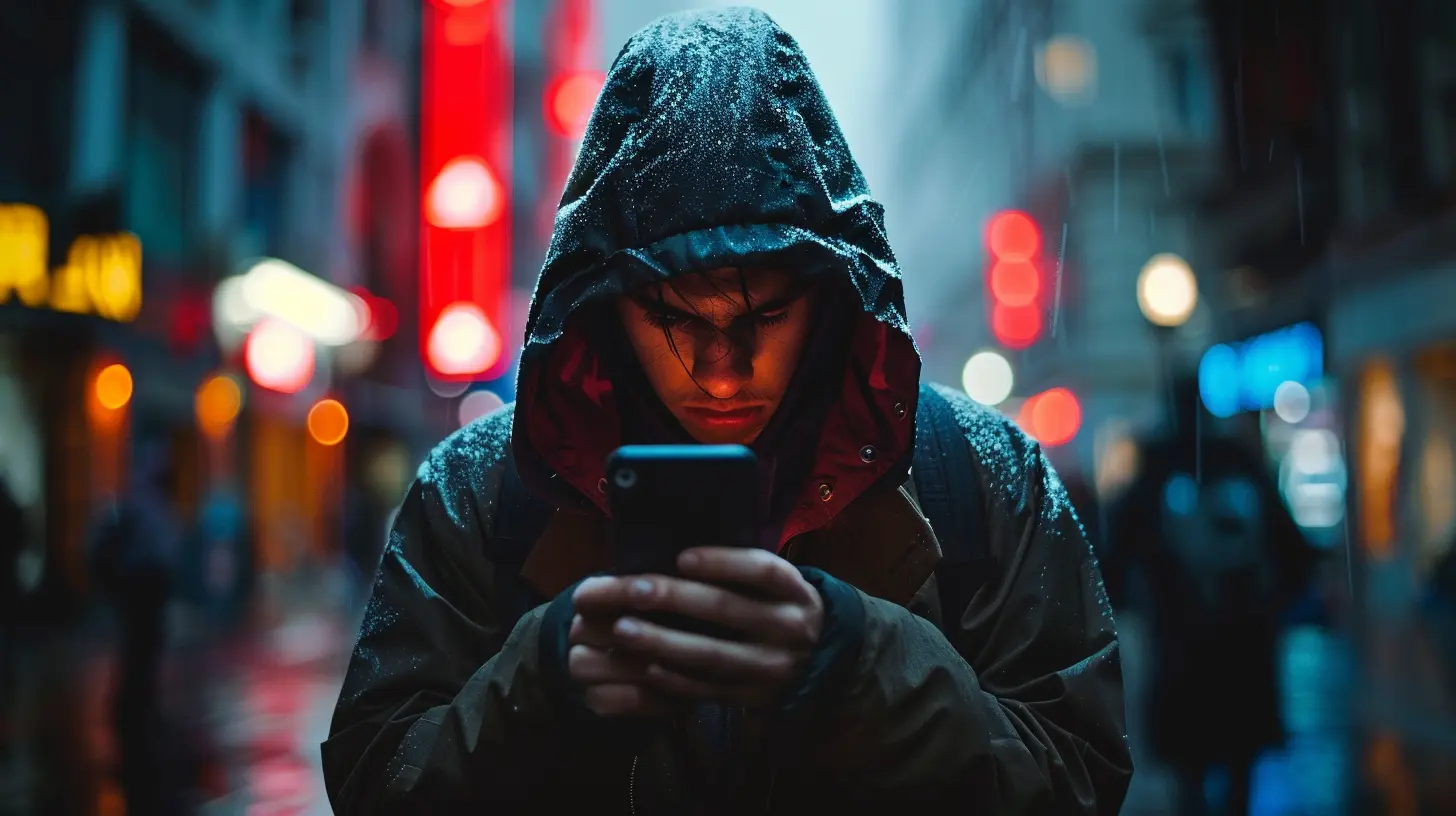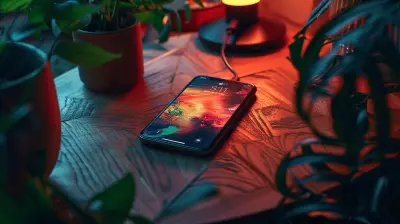The Risks of Free Apps: How They Can Compromise Your Privacy
2 May 2025
We all love free stuff, right? There's something inherently satisfying about downloading a new app without spending a dime. Whether it's a game, a productivity tool, or a photo-editing app, the lure of "free" is hard to resist. But as the old saying goes, "If you're not paying for the product, you are the product." This couldn't be truer when it comes to free apps.
While free apps might seem harmless, they often come with hidden costs—costs that you don't pay in cash but in something far more precious: your privacy. In this article, we’ll dive deep into the risks of free apps and how they can compromise your privacy. So, buckle up, because what you’re about to learn might just make you think twice before hitting that "download" button.

The Lure of Free Apps: Why Do We Download Them?
Before we get into the nitty-gritty of privacy risks, it's important to understand why free apps are so popular. Free apps are everywhere—on app stores, in ads, and even recommended by friends. They promise to make life easier, entertain us during a boring commute, or help us stay organized.The Appeal of 'Free'
The word "free" is powerful. It taps into our desire to get something for nothing. Most of us assume that if an app is free, it’s simply a generous offer from the developer, or maybe it’s supported by ads that are easy to ignore. But the reality is far more complex. Developers need to make money somehow, and when they're not charging you upfront, they have to find other ways to turn a profit.One of the most popular ways they do this is by collecting and selling your data. And that’s where the problems start.

How Free Apps Make Money
If an app is free, you might wonder, "How does the developer make money?" Well, there are several ways that free apps generate revenue, and unfortunately, many of them involve compromising your privacy.1. Ad-Supported Apps
A lot of free apps make money by displaying ads. Seems harmless, right? Well, not exactly. These ads are often targeted, which means the app is collecting data on you—your location, your browsing habits, and even your interactions with the app. All this information is then sold to advertisers, who use it to serve you more personalized (and sometimes creepy) ads.2. In-App Purchases
Many free apps offer in-app purchases. While this model doesn’t necessarily compromise your privacy, it does often lure users into spending more than they intended. And let’s be honest, who hasn't accidentally spent a little too much on that addictive mobile game?3. Selling Your Data
Here's where things get shady. Some free apps straight-up sell your data to third-party companies. This can include everything from your email address to your phone contacts and even your location history. Once your data is out there, you have little control over how it’s used—or who has access to it.
The Privacy Risks of Free Apps
Alright, now we’re getting to the heart of the issue. When you download a free app, you might be giving away more than you realize. Here are some of the most common ways that free apps can compromise your privacy.1. Data Collection Without Consent
Many free apps collect your data without explicitly asking for your consent. Sure, they might have a privacy policy buried somewhere in the fine print, but how many of us actually read those? By the time you realize what you’ve agreed to, your data has already been harvested.And it's not just harmless data like your name or email address. Some apps collect sensitive information such as your location, browsing history, contacts, and even your messages. This data can be used to build a detailed profile of you, which is then sold to advertisers or worse—used for malicious purposes.
2. Invasive Permissions
When you install a free app, it often asks for a list of permissions. Some of these make sense—like a photo editing app asking for access to your camera. But others? Not so much. Why does a simple flashlight app need access to your location, contacts, and microphone?These permissions allow the app to collect data about you that has nothing to do with the app’s functionality. Once you grant these permissions, the app can monitor your activities, track your location in real-time, or even listen to your conversations. Creepy, right?
3. Tracking and Profiling
Free apps are notorious for tracking your activities across multiple platforms. They don’t just monitor what you do within the app. Many free apps use tracking software to follow your online behavior across different websites and applications. This data is then used to build a profile of you, which can be sold to advertisers or data brokers.Here’s an example: ever notice how after searching for a product on Google, you start seeing ads for that same product on Instagram or Facebook? That’s because apps and websites are sharing your data with each other to serve you targeted ads. And guess what? Free apps are often the worst offenders when it comes to this kind of tracking.
4. Third-Party Sharing
One of the biggest risks of free apps is that they often share your data with third-party companies. This can include advertisers, data brokers, and even government agencies. Once your data is shared with third parties, you lose control over how it’s used.Some third parties might use your data for relatively harmless purposes, like serving you ads. But others could use it for more nefarious purposes, such as identity theft, phishing scams, or even surveillance.

Real-World Examples of Privacy Breaches by Free Apps
If you’re still not convinced that free apps can be risky, let’s look at a few real-world examples of privacy breaches caused by free apps.1. CamScanner
CamScanner was a popular app that allowed users to scan documents using their smartphones. Sounds pretty innocent, right? Wrong. It was discovered that the app contained malicious code that installed malware on users' devices. This malware was used to display intrusive ads and steal sensitive information from users.2. TikTok
TikTok, one of the most popular free apps in the world, has faced numerous privacy concerns. The app has been accused of collecting an excessive amount of data on its users, including location data, browsing history, and even biometric data like facial recognition. TikTok has also been accused of sharing user data with the Chinese government, which has raised significant concerns about privacy and national security.3. Facebook Messenger
Facebook Messenger is another free app that has raised privacy concerns. The app has been found to collect a wide range of data on users, including their location, contacts, and even the content of their messages. This data is then used to serve targeted ads and shared with third-party companies.How to Protect Your Privacy When Using Free Apps
Now that we’ve scared you a bit (sorry, not sorry), let’s talk about how you can protect your privacy when using free apps. Because let’s be real—we’re all going to keep using some free apps. The key is to be smart about it.1. Read the Privacy Policy
I know, I know—privacy policies are boring. But they’re also important. Before you download a free app, take a few minutes to skim through the privacy policy. Look for any red flags, like the app collecting more data than necessary or sharing your data with third parties.2. Limit Permissions
When an app asks for permissions, think carefully about whether it really needs them. Does a calculator app need access to your contacts? Probably not. If an app is asking for permissions that seem excessive, it’s a good idea to deny them.3. Use Privacy-Focused Apps
There are plenty of privacy-focused apps out there that prioritize your security. These apps often have transparent privacy policies, don’t track your data, and don’t share your information with third parties. A little research can go a long way in finding trustworthy alternatives.4. Keep Your Apps Updated
Developers release updates for a reason—often to fix security vulnerabilities. Make sure to keep your apps up to date to protect yourself from potential privacy breaches.5. Use a VPN
Using a virtual private network (VPN) can help protect your online activities from being tracked by third-party apps. A VPN encrypts your internet traffic, making it more difficult for apps to collect data on you.
Conclusion: Is the Cost of 'Free' Too High?
At the end of the day, nothing in life is truly free—including apps. While free apps can be convenient and fun, they often come with hidden costs that aren’t immediately apparent. By collecting your data, tracking your activities, and sharing your information with third parties, free apps can put your privacy at risk.So, the next time you’re tempted to download a free app, take a moment to consider the trade-off. Is the app really worth giving away your personal information? Maybe, maybe not. But at least now, you’ll be making an informed decision.
all images in this post were generated using AI tools
Category:
Online SecurityAuthor:

Vincent Hubbard
Discussion
rate this article
8 comments
Elowyn Romero
Free apps often monetize user data, posing significant privacy risks that users should be aware of before downloading.
May 17, 2025 at 12:46 PM

Vincent Hubbard
You're absolutely right. Users must be vigilant about privacy when using free apps, as data monetization practices can expose personal information.
Rhett Montgomery
In the realm of free delight, Privacy dances in shadowed light. Caution whispers through the code, Guard your secrets, don’t unload.
May 8, 2025 at 10:47 AM

Vincent Hubbard
Thank you for capturing the essence of privacy in the digital age! Your poetic perspective beautifully highlights the importance of staying vigilant with our personal data.
Celeste McEvoy
This article highlights a crucial issue in today's digital landscape. Free apps often monetize user data, raising significant privacy concerns. Users must remain vigilant and informed about permissions and data usage. Striking a balance between convenience and privacy is essential, urging developers to prioritize transparency and ethical data practices.
May 7, 2025 at 7:02 PM

Vincent Hubbard
Thank you for your insightful comment! You're absolutely right—users must be aware of how their data is used and advocate for greater transparency from app developers. Balancing convenience with privacy is indeed essential.
Fennec Torres
Thank you for highlighting the often-overlooked privacy concerns related to free apps. It's crucial for users to stay informed about how their data is being used. Your insights serve as a valuable reminder for all of us to prioritize our online privacy and make informed choices.
May 6, 2025 at 8:26 PM

Vincent Hubbard
Thank you for your thoughtful comment! I appreciate your support in raising awareness about online privacy.
Laila Yates
This article highlights crucial points about the privacy risks associated with free apps. Users must be aware that many of these applications collect and share personal data, often without clear consent. It’s essential to prioritize privacy by scrutinizing app permissions and opting for trusted alternatives when possible.
May 4, 2025 at 6:58 PM

Vincent Hubbard
Thank you for your insightful comment! You’re absolutely right—users must stay vigilant about app permissions and prioritize their privacy.
Lacey McKellar
This article effectively highlights the often-overlooked privacy risks associated with free apps. It's a crucial reminder to stay informed and make conscious choices about our digital habits.
May 3, 2025 at 3:07 AM

Vincent Hubbard
Thank you for your insightful comment! I'm glad you found the article relevant and a helpful reminder about the importance of being mindful of our digital choices.
Corinne O'Neal
Stay informed and protect your privacy—knowledge is your best defense against risks!
May 2, 2025 at 12:21 PM

Vincent Hubbard
Absolutely! Staying informed empowers users to make safer choices and safeguard their personal information.
Yolanda Cummings
Free apps: the digital equivalent of 'try before you buy'—except sometimes the price is your privacy! Who knew data could be the fine print in fun?
May 1, 2025 at 11:32 PM

Vincent Hubbard
Absolutely! Free apps often come with hidden costs, and it's crucial for users to be aware of how their data is being used. Prioritizing privacy is essential even when the app seems 'free.
MORE POSTS

Can Electric Vehicles Handle Off-Road Adventures?

How Wearable Technology Is Enhancing Workplace Productivity

Cloud Computing for Education: Enhancing Learning and Collaboration

Wireless Charging vs. Wired: Which Is Better for Your Devices?

Exploring the Role of AI in Cybersecurity

How Battery Innovation Is Empowering Medical Devices